College
It Happened to Me
Series Editor: Arlene Hirschfelder
Books in the It Happened to Me series are designed for inquisitive teens digging for answers about social issues, certain illnesses, or lifestyle interests. These books feature up-to-date information, relatable teen views, and thoughtful suggestions to help you figure out stuff. Besides special boxes that highlight singular facts, each book is enhanced with the latest reading lists, websites, and other recommendations.
The following titles may also be of interest:
Activism: The Ultimate Teen Guide , by Kathlyn Gay
ADHD: The Ultimate Teen Guide , by John Aspromonte
Autism Spectrum Disorder: The Ultimate Teen Guide , by Francis Tabone
Bigotry and Intolerance: The Ultimate Teen Guide , by Kathlyn Gay
Bullying: The Ultimate Teen Guide , by Mathangi Subramanian
Chronic Illnesses, Syndromes, and Rare Disorders: The Ultimate Teen Guide , by Marlene Targ Brill
Creativity: The Ultimate Teen Guide , by Aryna M. Ryan
Depression: The Ultimate Teen Guide , by Tina P. Schwartz
Eating Disorders: The Ultimate Teen Guide , by Jessica R. Greene
Epilepsy: The Ultimate Teen Guide, 2nd Edition , by Kathlyn Gay
Food Allergies: The Ultimate Teen Guide , by Jessica Reino
Self-Injury: The Ultimate Teen Guide , by Judy Dodge Cummings
Sexual Decisions: The Ultimate Teen Guide, 2nd Edition , by L. Kris Gowen
Shyness: The Ultimate Teen Guide , by Bernardo J. Carducci, PhD, and Lisa Kaiser
Social Networking: The Ultimate Teen Guide , by Jenna Obee
Speech and Language Challenges: The Ultimate Teen Guide , by Marlene Targ Brill
Substance Abuse: The Ultimate Teen Guide , by Sheri Bestor
College
The Ultimate Teen Guide
Lisa Maxwell Arter
ROWMAN & LITTLEFIELD
Lanham Boulder New York London
Published by Rowman & Littlefield
An imprint of The Rowman & Littlefield Publishing Group, Inc.
4501 Forbes Boulevard, Suite 200, Lanham, Maryland 20706
www.rowman.com
Unit A, Whitacre Mews, 26-34 Stannary Street, London SE11 4AB
Copyright 2019 by The Rowman & Littlefield Publishing Group, Inc.
All rights reserved . No part of this book may be reproduced in any form or by any electronic or mechanical means, including information storage and retrieval systems, without written permission from the publisher, except by a reviewer who may quote passages in a review.
British Library Cataloguing in Publication Information Available
Library of Congress Cataloging-in-Publication Data
Names: Arter, Lisa Maxwell, 1974 author.
Title: College : the ultimate teen guide / Lisa Arter.
Description: Lanham : Rowman & Littlefield, [2019] | Series: It happened to me | Includes bibliographical references.
Identifiers: LCCN 2018022683 (print) | LCCN 2018031045 (ebook) | ISBN 9781538104132 (electronic) | ISBN 9781538104125 (cloth : alk. paper)
Subjects: LCSH: College student orientationUnited StatesHandbooks, manuals, etc. | Universities and collegesAdmissionHandbooks, manuals, etc.
Classification: LCC LB2343.32 (ebook) | LCC LB2343.32 .A77 2019 (print) | DDC 378.1/98dc23
LC record available at https://lccn.loc.gov/2018022683
 The paper used in this publication meets the minimum requirements of American National Standard for Information SciencesPermanence of Paper for Printed Library Materials, ANSI/NISO Z39.48-1992.
The paper used in this publication meets the minimum requirements of American National Standard for Information SciencesPermanence of Paper for Printed Library Materials, ANSI/NISO Z39.48-1992.
Printed in the United States of America
To _____________________________ ,
[ write your name on the preceding line ]
without whom this monumental addition to quality literature
could not have been accomplished.
Bless you.
Special recognition goes to my mother, who taught me to write;
my husband, who encouraged me to write;
and my children, who let me write.
Abundant gratitude to Ken Ayers, Mandy Jones,
and all of the high school and college students, faculty, and staff
who shared questions, comments, and insights.
And to Kimbecause shoes.
How to Use This Book
D ear Book Owner (if you are a book borrower, jump to the second paragraph),
Dont just read this book use it . Carry it around with you and write in it, dog-ear pages, highlight and underline important text (OK, I know that would mean all of it would be underlined, but you can use personal preference). It isnt a novel, so you dont need to read it in order. Jump around. Show it to your friends and roommates and encourage them to buy their own copy (seriously, I have student loans Im still repaying. And dont judgelikely, you will, too). I want this book to look like its survived a battle by the end of your freshman yearjust like you.
Because getting into college is only the first part of the adventure, Ive divided this book into two parts: (1) getting into college and (2) staying in college. Both halves are full of valuable information as well as sources that will help you deepen your understanding. To decide what I should include in this book, I spoke with current and former high school and college students, counselors, faculty, staff, administrators, residence assistants, learning support personnel, campus security, and parents. While some of the information, especially in part 2, may seem tangential to the college experience, each of those areas is a reason students have reported contributed to their decision to drop out of college. For example, not knowing how to do laundry, effectively grocery shop, or create and stick to a personal budget are stressors that contribute to a students feeling overwhelmed. This feeling of being overwhelmed causes anxiety and/or depression to the extent that students, who are otherwise progressing in their college experience, quit. Health concerns (physical, mental, and sexual) are also frequent contributors to a students decision to drop out. Hopefully, you will never grapple with these issues personally but it is likely that you will know a college peer who does. Having this information will better prepare you for success. As the proverb says: forewarned is forearmed.
Best of luck.
Introduction
I n 1974 (ironically, the year I was born), Richard Armour published The Academic Bestiary , a satirical dictionary of colleges and universities. More than thirty years later, while digging through my favorite used bookstore during a brief break between doctoral classes, I came across a first-edition copy of this book (first editions make English teachers weak in the knees). Despite his having published more than sixty-five books, I had never heard of Dr. Armour. I read the back cover, giggled, and paid the six dollars for the book.
Ten years later, I still enjoy Armours anthropomorphic descriptions of various elements of higher education, or Academe, where life is different from... the Real World in many ways, some of them incredible to the inexperienced. The typical eighteen-year-old has spent two-thirds of his or her life in school, but many aspects of the Academe resemble school in only the vaguest disguise. Therefore, while some may warn that the ivory arches of a campus should quote Dantes version of The Inferno (Abandon all hope, ye who enter here), the truth is the motto of Apollos temple in Delphi (Know thyself) is more apt to college life (perhaps with a bit of Remember thou art mortal thrown in for good measure).
You may have several reasons for choosing to attend college. Common ones I hear from freshmen include an influential teacher, an occupational goal that requires a degree, wanting to leave home, and my parents went and are making me go. If you are truly a first-generation higher education perspective student (whewthats a long title; lets shorten it to first-gen ), the last reason isnt pertinent to you. Although, perhaps your parents are making you go because they didnt and they want a different life for you. If you arent a first-gen, well allow you to share the information as we believe in the more the merrier in higher education.
Next page
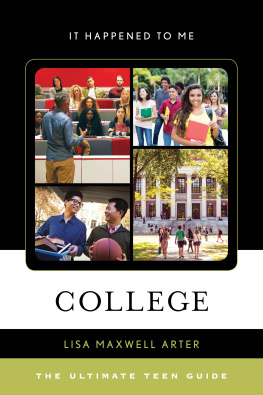
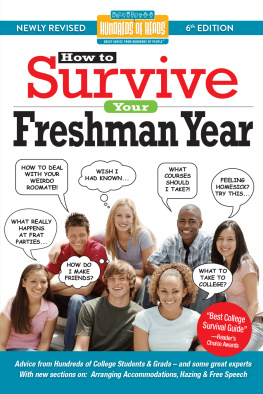
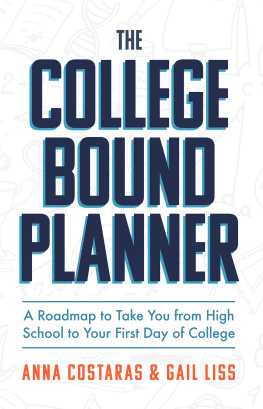

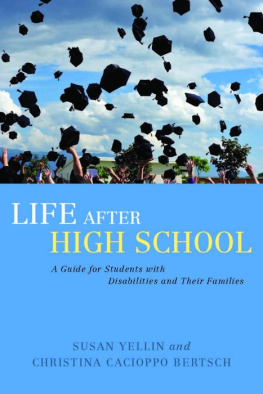
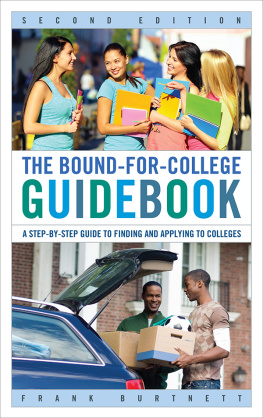
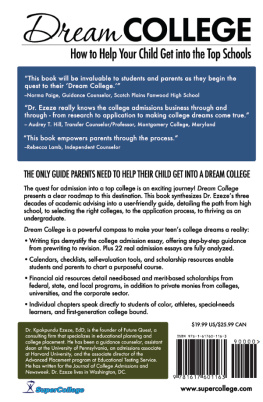
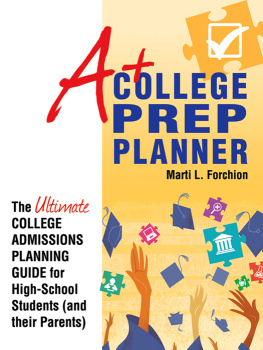
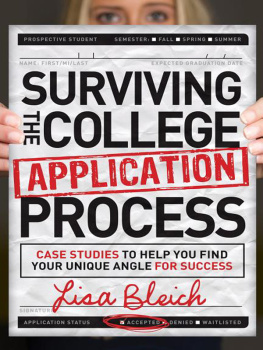
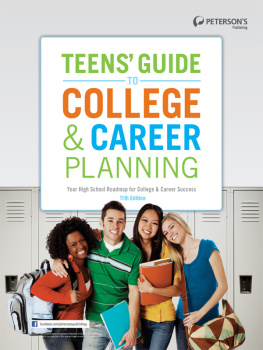
 The paper used in this publication meets the minimum requirements of American National Standard for Information SciencesPermanence of Paper for Printed Library Materials, ANSI/NISO Z39.48-1992.
The paper used in this publication meets the minimum requirements of American National Standard for Information SciencesPermanence of Paper for Printed Library Materials, ANSI/NISO Z39.48-1992.